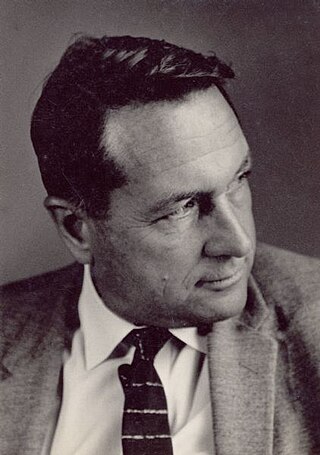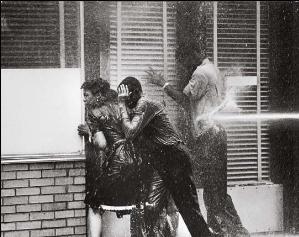
The Great Society was a set of domestic programs in the United States launched by President Lyndon B. Johnson in 1964 and 1965. The term was first referenced during a 1964 speech by Johnson at Ohio University, then later formally presented at the University of Michigan, and came to represent his domestic agenda. The main goal was the total elimination of poverty and racial injustice.

Head Start is a program of the United States Department of Health and Human Services that provides comprehensive early childhood education, health, nutrition, and parent involvement services to low-income children and families. It is the oldest and largest program of its kind. The program's services and resources are designed to foster stable family relationships, enhance children's physical and emotional well-being, and establish an environment to develop strong cognitive skills. The transition from preschool to elementary school imposes diverse developmental challenges that include requiring the children to engage successfully with their peers outside the family network, adjust to the space of a classroom, and meet the expectations the school setting provides.

Myles Falls Horton was an American educator, socialist, and co-founder of the Highlander Folk School, famous for its role in the Civil Rights Movement. Horton taught and heavily influenced most of the era's leaders. They included Martin Luther King Jr., Rosa Parks, John Lewis, James Bevel, Bernard Lafayette, and others who would create the Nashville Student Movement, Ralph Abernathy, John B. Thompson, and many others.

John Hamilton McWhorter V is an American linguist with a specialty in creole languages, sociolects, and Black English. He is currently an associate professor of linguistics at Columbia University, where he also teaches American studies and music history. He has authored a number of books on race relations and African-American culture, acting as political commentator especially in his New York Times newsletter.

ONE Campaign is an international, non-partisan, non-profit advocacy and campaigning organization that fights extreme poverty and preventable disease, particularly in Africa, by raising public awareness and pressuring political leaders to support policies and programs that save lives and improve futures.

The system of education in Uganda has a structure of 7 years of primary education, 6 years of secondary education, and 3 to 5 years of post-secondary education. Education in Uganda is administered in English. All throughout the levels in the education structure, modules are taught and assessed in English. The government of Uganda recognizes education as a basic human right and continues to strive to provide free primary education to all children in the country. However, issues with funding, teacher training, rural populations, and inadequate facilities continue to hinder the progress of educational development in Uganda. Girls in Uganda are disproportionately discriminated against in terms of education; they face harsher barriers when trying to gain an education and it has left the female population disenfranchised, despite government efforts to close the gap.
In the United States, acting white is a pejorative term, usually applied to Black people, which refers to a person's perceived betrayal of their culture by assuming the social expectations of white society. It can be applied to success in education, though this view is highly debated. In 2020, 93.6% of African-Americans between 25 and 39 had a high school diploma, on par with the national average, though African-Americans have a higher tendency to drop out from college than their white peers.

The Birmingham campaign, also known as the Birmingham movement or Birmingham confrontation, was an American movement organized in early 1963 by the Southern Christian Leadership Conference (SCLC) to bring attention to the integration efforts of African Americans in Birmingham, Alabama.

In 2022, Freedom House rated Nepal’s human rights at 57 out 100, determining the country's status in terms of fundamental freedoms as "partly free".

West Farms is a residential neighborhood in The Bronx, New York City. Its boundaries, are: Bronx Park to the north, the Bronx River Parkway to the east, the Cross-Bronx Expressway to the south, and Southern Boulevard to the west. East Tremont Avenue is the primary thoroughfare through West Farms.
Camfed is an international non-governmental, non-profit organization founded in 1993 whose mission is to eradicate poverty in Africa through the education of girls and the empowerment of young women. Camfed programs operate in Zimbabwe, Zambia, Ghana, Tanzania and Malawi.
Conditional cash transfer (CCT) programs aim to reduce poverty by making welfare programs conditional upon the receivers' actions. The government only transfers the money to persons who meet certain criteria. These criteria may include enrolling children into public schools, getting regular check-ups at the doctor's office, receiving vaccinations, or the like. CCTs seek to help the current generation in poverty, as well as breaking the cycle of poverty for the next through the development of human capital. Conditional cash transfers could help reduce feminization of poverty.
The history of education in the United States covers the trends in formal educational in America from the 17th century to the early 21st century.
Here are some of Senator John Edwards's votes and remarks on various issues.

The Harlem Children's Zone (HCZ) is a nonprofit organization for children and families living in Harlem, providing free support in the form of parenting workshops, a preschool program, three charter schools, and child-oriented health programs for thousands of children and families. The HCZ is "aimed at doing nothing less than breaking the cycle of generational poverty for the thousands of children and families it serves."
Educational inequality is the unequal distribution of academic resources, including but not limited to school funding, qualified and experienced teachers, books, and technologies, to socially excluded communities. These communities tend to be historically disadvantaged and oppressed. Individuals belonging to these marginalized groups are often denied access to schools with adequate resources. Inequality leads to major differences in the educational success or efficiency of these individuals and ultimately suppresses social and economic mobility. Inequality in education is broken down into different types: regional inequality, inequality by sex, inequality by social stratification, inequality by parental income, inequality by parent occupation, and many more.
The Cloward–Piven strategy is a political strategy outlined in 1966 by American sociologists and political activists Richard Cloward and Frances Fox Piven. The strategy aims to utilize "militant anti poverty groups" to facilitate a "political crisis" by overloading the welfare system via an increase in welfare claims, forcing the creation of a system of guaranteed minimum income and "redistributing income through the federal government".
Say Yes to Education, Inc. is a U.S. non-profit organization that seeks to improve inner-city education. The main focus of Say Yes is to increase high school and college graduation rates by offering a range of support services to at-risk, economically disadvantaged youths and families, and by pledging full scholarships for a college or vocational education to children living in poverty.
Human trafficking in Nepal is a growing criminal industry affecting multiple other countries beyond Nepal, primarily across Asia and the Middle East. Nepal is mainly a source country for men, women and children subjected to the forced labor and sex trafficking. U.S. State Department's Office to Monitor and Combat Trafficking in Persons placed the country in "Tier 2" in 2017.

In 2020, school systems in the United States began to close down in March because of the spread of COVID-19. This was a historic event in the history of the United States schooling system because it forced schools to shut-down. At the very peak of school closures, COVID-19 affected 55.1 million students in 124,000 public and private U.S. schools. The effects of widespread school shut-downs were felt nationwide, and aggravated several social inequalities in gender, technology, educational achievement, and mental health.










